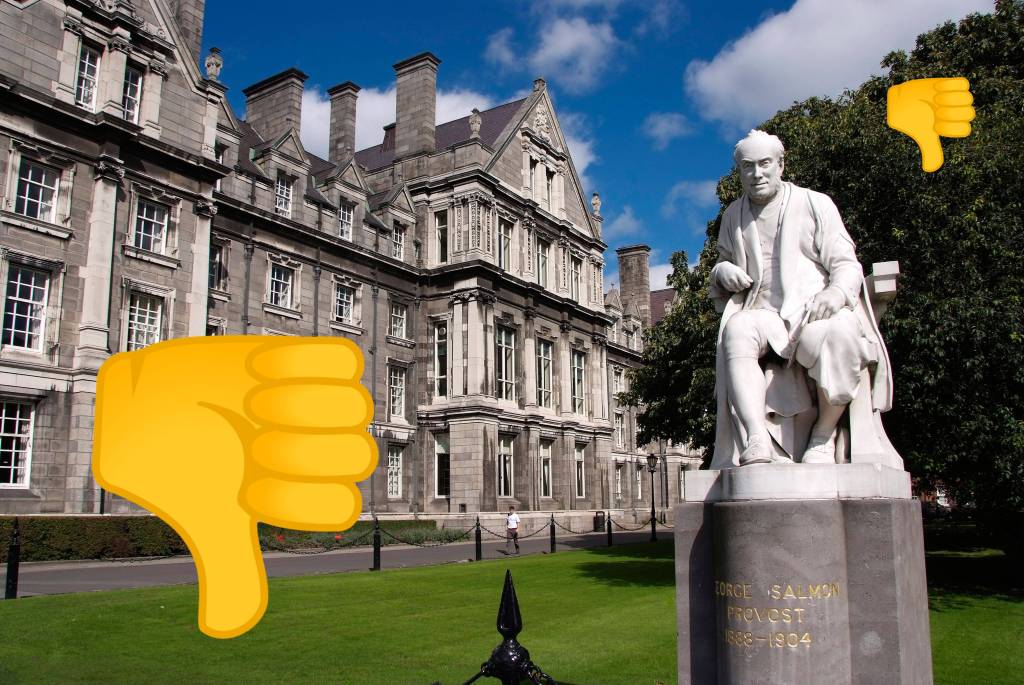Higher education is a huge investment, underwritten by one key assurance. Whether you spend your university years smashing Firsts or stomaching vodka dashes in your 9Am lecture, all students are united by one shared guarantee: that your higher education fees pay for in-person lectures from academics on hand to answer your questions.
At Trinity College Dublin, Ireland’s oldest and most prestigious university, this is not the case. A VICE investigation has found that at least eight courses have reused lectures recorded during the 2020 lockdown, in place of the up-to-date, face-to-face teaching expected by this year’s students.
Videos by VICE
“It goes without saying that 2020 has been a bit of a crazy year,” one second year English Literature lecture seen by VICE begins. “Alongside the global pandemic we have race riots in America [and] Black Lives Matter protests.” The lecturer continues: “The year began as Australia’s record shattering summer of bush fires bled into January and February of this year.”
The lecture was also uploaded via a private YouTube link that explicitly states it was uploaded one year ago.
“It’s very disheartening that students are supposed to give the same quality of work with online learning conditions, while professors aren’t held to the same standards,” Saoirse, a second year English student, tells VICE.
Other courses such as Business Economics and Social Studies, Medicine, Physical Sciences and Chemical Sciences use the platform Blackboard to upload lectures, many of which are accompanied by the subtitle “uploaded one year ago”.
In a recorded first-year Medicine lecture, one academic discusses “the vaccines which are currently being developed”, despite the fact that 80 percent of adults in Ireland have now been fully vaccinated.
Caoimhe, a second-year Medicine student, attended an in-person tutorial with one of her lecturers. “‘Someone asked if they could answer a question about a lecture from that week and our lecturer said as a joke: ‘I hope I can answer it, I haven’t seen this lecture since last year.’”
Referencing links between course content and current affairs usually urges students to put their learning into action. This year, the outdated references to 2020 events simply highlights the college’s indifference to student’s academic needs. This begs the question: What exactly are students paying extremely high university fees for?
Reuse of lectures without the reduction of fees is not the only thing Trinity has been criticised for. A widely shared Instagram post from the pro face to face teaching organisation @tcd_f2f argued that the university’s actions demonstrated a disregard for student’s mental health and educational wellbeing.
“Other Dublin Universities, such as DCU and UCD, have resumed in-person teaching of up to 500 students per lecture with masks, as per government guidance”, the post reads. “Trinity, however, has decided to reduce this number to 150 students per lecture theatre, with discretion being given to each school to decide whether they will return to campus at all.”
Gisèle Scanlon, president of the Graduates Students Union, which represents over 5,200 students, tells VICE: “There’s so much hurt. I’m still fielding for students who feel let down and forgotten. I’ve been to the meetings, I’ve asked for refunds and I’ve been told the funding isn’t there for that.”
Tired of the college’s indifference, students crowded into Front Square on the 22nd of September to protest Trinity’s decision to continue with online teaching, chanting “let us in”. Lázló Molnarfi, chair of Students4Change and a key organiser in the protest, tells VICE that the university is behaving like a profit-hungry corporation, with little regard for student’s wellbeing.
“They spent the summer writing meaningless emails full of empty promises. They lied to us, because if they had communicated to us clearly, then people would have deferred, incurring a loss of profit.”
Molnarfi’s accusation references a collection of emails sent during the summer to students. One of these emails, sent on the 16th of June, stated that an “enormous amount of planning” had taken place to enable a “comprehensive return to college.”
Many students found emails like this misleading, and in some cases, financially damaging.
Vito, a second year Politics, Philosophy, Economics and Sociology student, saw emails like these promising a return to campus and decided to book student accommodation for the year. This cost €10,000, annually, thanks to Dublin’s housing crisis and limited student accommodation options. After paying, Vito discovered that he was only scheduled for one hour of in-person teaching per week. “They decided to risk wasting our money to save face. They genuinely do not care what kind of education the corona generation gets.”
In a statement to VICE, a Trinity spokesperson said: “The use of recorded lectures, where course material is unchanged from the previous year, can be a sensible use of lecturers’ time, freeing them up to spend additional time on engaging with smaller class groups where lecture material can be discussed. Some schools have long had a standard practice of recording lectures to make them available for students.
“That this practice has continued for some, by no means all, lectures, in no way contradicts the fact the intensive planning has been undertaken for this year to maximise face to face teaching in line with the relaxation of public health restrictions.”
Fury among students is growing as many feel that they have been lied to and their money has been wasted.
“Trinity have spat at us in the face,” Lázló Molnarfi tells VICE. “We thus demand an immediate return to campus or compensation for the loss of our in-person educational and on-campus experience, and this is why we are protesting.”






